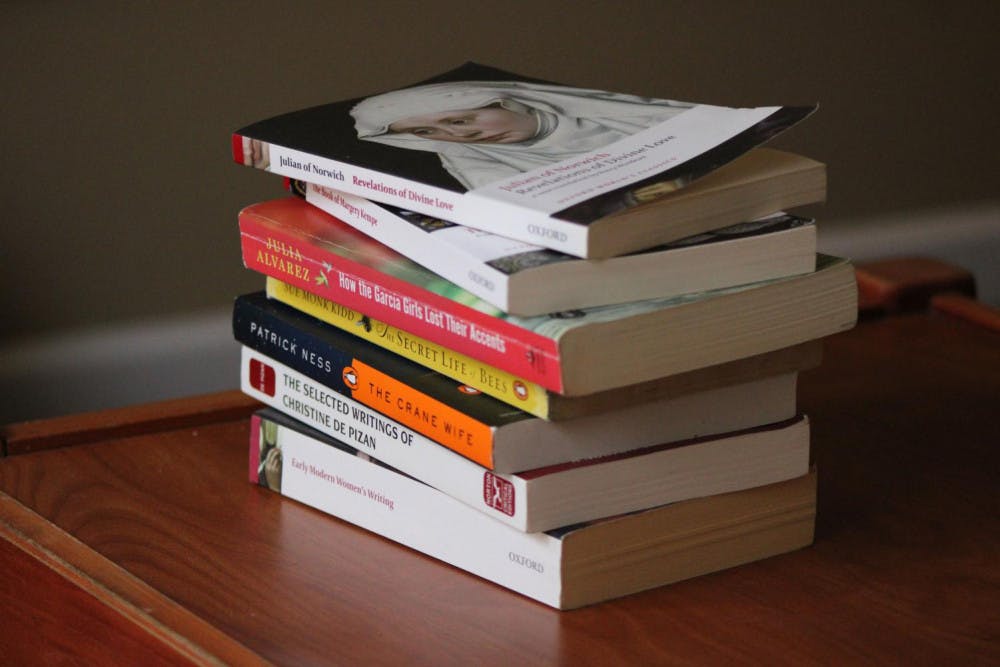
The new director of the Great Books program, Charlotte Thomas, is working on a three-year plan to incorporate more works written by female authors and authors of color into the Great Books curriculum.
The Great Books program is one of the two general education tracks for students in the College of Liberal Arts and Sciences. Students on the GBK track are required to take seven Great Books courses, where they read texts that helped create or build upon a foundation for western civilization.
Currently, the majority of the required texts throughout the program were written by white men, which has caused some students to express dissatisfaction in the lack of inclusivity in the curriculum.
Sophomore Ebony Lumas said she was told by a previous director that it would be unlikely that she would read any texts written by female authors or authors of color before the last two courses of the program. This was one of the reasons that she dropped the Great Books program after the first course.
“I had a problem with the lack of females and people of color or people of different genders,” Lumas said. “Diversifying literature is not going to hurt the student, is not going to hurt the professor —it's beneficial … The harmful thing was the old narrative and the old way of Great Books’ set-up. Diversifying it will bring new life to it and make it more accessible to a lot more students.”
[pullquote speaker="Charlotte Thomas, director of GBK" photo="" align="left" background="off" border="right" shadow="off"]When the cultural winds are blowing, and you can harness that energy to do something good ... I think you should.[/pullquote]
Thomas is currently trying to put a three-year plan into action. Professors involved in the program are in working groups based on what GBK course they teach to inform the process.
Those professors are researching women and people of color that fit in the chronology and are a part of the western conversation that could potentially be added into the Great Books curriculum. Professors in these groups are also reaching out to professors in the women’s and gender studies and Africana studies departments, along with other academics outside of Mercer.
In each Great Books course, there’s something that Thomas referred to as a eighty/twenty rule: 80% to 100% of the texts from the course must come from the Great Books core. But up to 20% can be added in by professors, as long as those texts come from the same chronological period as the rest of the texts and had an effect on the western tradition.
As early as next semester, Thomas is encouraging professors to utilize that 20% to incorporate texts from diverse authors. She wants to be able to see how those texts are discussed in classroom settings so she can better understand how new texts would work with the currently-required texts.
“I’ve asked everybody to think about, and I’m not requiring it, but to think about using their 20% for these texts off of the lists that we’ve compiled,” Thomas said. “We just have these conversations. Instead of having them abstractly, we have them concretely, because we actually have experience doing it.”
By the third year, Thomas hopes to have funding for reading groups about the new texts, so that professors can learn about them to feel comfortable teaching them to their students.
Also in that year, professors in the Great Books program will discuss what current texts should be moved out of the core to make room for new, more inclusive additions.
Thomas attributes her decision to make a push for greater diversity in the Great Books program to the increased attention of the #MeToo and Black Lives Matter movements.
“When the cultural winds are blowing, and you can harness that energy to do something good,” Thomas said, “I think you should.”
Like Lumas, junior Sarah Moore supports the change. She brought up Mercer’s motto of “changing the world” and said that the GBK curriculum contradicts that message by only selecting authors whose work supports current systems.
“By expanding the curriculum to include more diverse voices, I think the Great Books program will finally achieve what it claims to do: allow students to understand their 21st-century selves and society through the great books of the past,” Moore said.
Great Books program implements three-year diversity plan

The Great Books program is one of the two general education tracks for students in the College of Liberal Arts and Sciences.
This story won Best of SNO Sept. 28, 2020.




